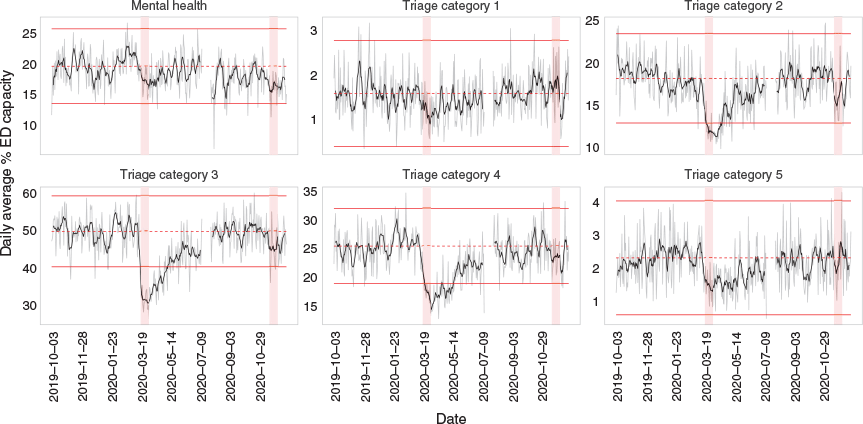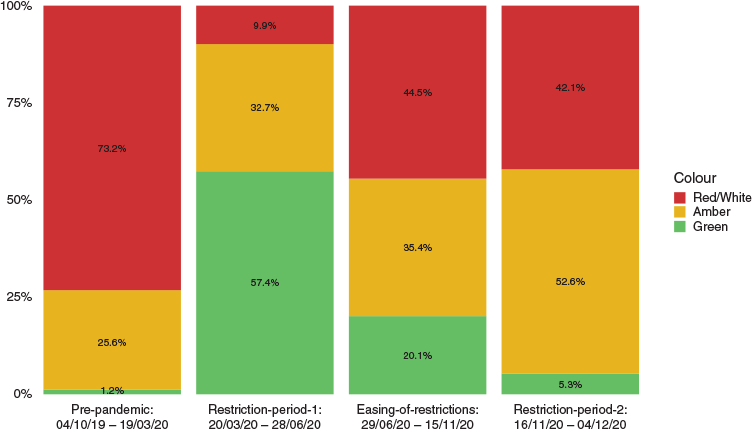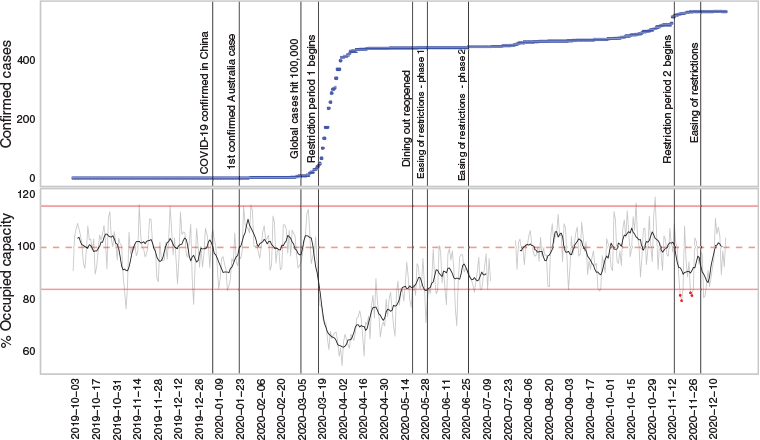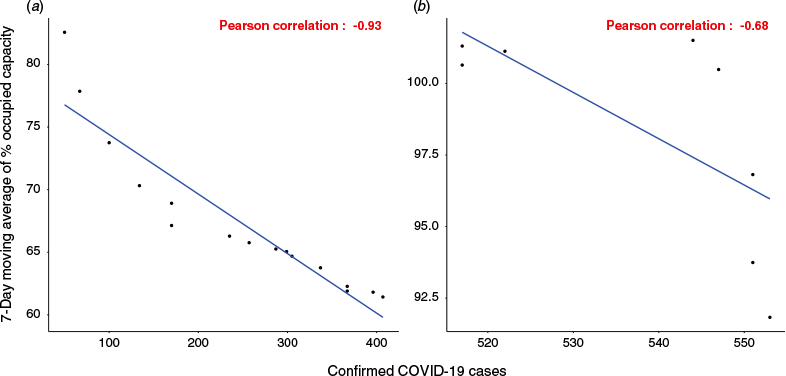Impact of the COVID-19 pandemic on South Australia’s emergency departments: evidence from two lockdowns
Laura M. Boyle A B , Mark Mackay C , Nigel Bean B D and Matthew Roughan B D
A B , Mark Mackay C , Nigel Bean B D and Matthew Roughan B D
A Mathematical Sciences Research Centre, School of Mathematics and Physics, Queen’s University Belfast, Northern Ireland, UK.
B Australian Research Council Centre of Excellence for Mathematical and Statistical Frontiers, The University of Melbourne, Vic., Australia.
C UniSA Clinical and Health Sciences, University of South Australia, Adelaide, SA, Australia. Email: mark.mackay@unisa.edu.au
D School of Mathematical Sciences, The University of Adelaide, SA, Australia. Email: nigel.bean@adelaide.edu.au; matthew.roughan@adelaide.edu.au
E Corresponding author. Email: laura.m.boyle@outlook.com
Australian Health Review 45(5) 533-539 https://doi.org/10.1071/AH20366
Submitted: 22 December 2020 Accepted: 24 February 2021 Published: 20 May 2021
Journal Compilation © AHHA 2021 Open Access CC BY
Abstract
Objective This study assessed the impact of the COVID-19 pandemic on emergency departments (EDs) in South Australia, measured by changes in the number and casemix of patients in the system over time.
Methods Data from the South Australia Emergency Department Dashboard, updated every 30 min, were analysed for the period 4 October–21 December 2020. The Dashboard reports live counts of the number and type of patients in each of the six adult metropolitan public EDs in Adelaide, South Australia.
Results There was a significant difference in the mean daily average occupied ED capacity before and during two distinct increases in COVID-19 cases in South Australia. An increase in COVID-19 cases coincided with a decrease in patients in EDs (Pearson’s r = –0.93 and –0.67; P < 0.001 for both). Presentations in Australasian Triage Scale (ATS) Categories 2–5 decreased during these periods, whereas ATS Category 1 stayed constant. Mental health patients continued to present to the ED, despite the overall drop in ED presentations.
Conclusions During the two periods of COVID-19 case growth in South Australia, there was a significant drop in the number of patients presenting to the major public EDs and a change in the casemix of patients over time.
What is known about the topic? EDs in Australia often operate at or over capacity, with frequent reports of ambulance ramping, access block and long waiting times. There have been reports internationally of significant declines in ED presentations throughout the COVID-19 pandemic.
What does this paper add? This paper uses a novel publicly available data source that is available in real time to contribute a new perspective from South Australia, which has experienced two distinct periods of strict restrictions and lockdown. The research showed that the number of mental health presentations remained consistently high, despite a significant overall decline in ED occupancy.
What are the implications for practitioners? This study demonstrates that South Australians are accessing emergency medical treatment differently in response to the COVID-19 pandemic. In the context of an overall decline in presentation numbers, the number of mental health-related presentations has not changed significantly, suggesting that this trend should be closely monitored. The findings corroborate the national concern that unwell people have avoided accessing emergency medical care during the pandemic, leading to worse outcomes and increased need for healthcare resources at a later date. It will be important to monitor and quickly detect further changes in ED usage using real-time data as the pandemic evolves, as well as in any future significant health crises.
Keywords: health systems, hospitals, health services research, COVID-19, Australia, emergency department presentations, emergency treatment, medical care.
Introduction
Emergency departments (EDs) are a critical component of healthcare systems and are often the first point of contact for patients requiring urgent medical attention.1 The performance of EDs in delivering timely treatment has been a prominent topic in political and media discourse for many years, attracting substantial negative attention on account of excessive wait times, ambulance ramping and bed blocking (which arises from a lack of availability of alternative in-patient treatment or community care).2 These problems are the most obvious symptom of a healthcare system that is running very close to and often exceeding its capacity.3
COVID-19 gained global attention as a novel infectious disease in early 2020. The World Health Organization (WHO) declared it a Public Health Emergency of International Concern on 30 January 2020 and a pandemic on 11 March 2020.4 As the COVID-19 pandemic evolves, the public in Australia and internationally are required to practise ‘social distancing’ to help ‘flatten the curve’.5 The goal of social distancing is to slow the spread of COVID-19 infection so that the number of people requiring hospital treatment will not overrun health system capacity. The Australian government has implemented various levels of social distancing, varying from minor changes in daily life (e.g. keeping a distance of 1.5 m from other people) to extreme changes (e.g. closing social venues and requiring people to work from home if at all possible).6 Social distancing measures are adjusted over time in response to changes in the epidemiological situation.7
Social distancing measures in response to the COVID-19 pandemic have resulted in high unemployment rates, with the Australian Taxation Office reporting a decrease of 2.9% in the payroll system between 14 March and 14 November 2020.8 Increased unemployment and other pandemic-related stress has coincided with heightened demand for mental health support, with Lifeline reporting increased demand during the pandemic and 8 September 2020 as its busiest day in 57 years of operation.9 A survey of 5070 Australian adults reported that 78% of participants experienced a negative change to their mental health since the beginning of the COVID-19 pandemic,10 whereas the WHO announced that COVID-19 has disrupted or halted mental health services in 93% of countries.11 Of further concern is the marked decline in cancer screening checks performed since March 2020.12
During such a pandemic, it is important to detect changes in the way people access emergency medical services, monitor the ability of EDs to continue to deliver safe and timely medical care and respond to any new challenges that arise. Internationally, reports on health system activity have indicated a significant decrease in the number of ED presentations during the COVID-19 pandemic.13–15 The aim of this study was to determine the impact of COVID-19 on South Australia’s major EDs, using publicly available data in near real time to examine changes in the number and casemix of patients presenting for emergency treatment during two distinct periods of strict social distancing spanning a total of 11.5 weeks.
Methods
The ED dataset used in this study was collected from the South Australia Emergency Department DashboardA for the period 4 October–21 December 2020 inclusive, producing 48 observations daily at 30-min intervals for each ED. The collection process was automated to collect data at 15-min intervals, ensuring each 30-min update time was captured at least once. Where the Dashboard failed to update, the last observation was carried forward for statistical analysis. Data on the number of COVID-19-confirmed cases was extracted from a publicly available live dashboard.16 The ED dashboard data between 14 and 31 July 2020 are missing due to a problem in the data collection system. Car accident statistics were accessed from South Australia Police reports.B
Statistical analysis was performed using R software.17 Daily trends in the ED dashboard were smoothed using a 7-day moving average to facilitate the identification of the important underlying trend (signal) from noise (daily variation). Statistical process control charts were used to visualise the change in trends over time18 using the R package qcc,19 with limits calculated using data spanning 4 October 2019–19 March 2020 (pre-pandemic). Pearson’s correlation coefficient (r) and Welch’s analysis of variance (ANOVA) test were used to compare four distinct stages of the data: (1) pre-pandemic (4 October 2019–19 March 2020); (2) Restriction Period 1 (20 March–4 April 2020); (3) easing of restrictions (5 April–11 November 2020); and (4) Restriction Period 2, including Lockdown 2 (12 November–4 December 2020).
Results
The ED dashboard incorporates a traffic light system of markers to show the ‘busyness’ of each ED. The traffic lights change based on the occupancy level as a percentage of ED beds. As well as the three traffic light colours of green (0–80% occupancy), amber (80–95% occupancy) and red (95–125% occupancy), the dashboard shows a ‘white hot’ state, indicating occupancy of >125%. Table 1 and Fig. 1 show that before the number of COVID-19 cases started to increase in South Australia (before 20 March 2020), Adelaide’s EDs were operating at a daily average of ‘red’ or ‘white hot’ 73% of the time. During Restriction Period 1, this percentage dropped to 0%. Throughout the easing of restrictions (29 June–15 November 2020), the percentage of ‘red’ and ‘white hot’ days increased to 45%, and then decreased again to 42% during Restriction Period 2. EDs operated at a daily average of ‘green’ during all three strict lockdown days between 19 and 21 November 2020.
The number of COVID-19 cases in South Australia initially increased during Restriction Period 1 until 4 April 2020, when the rate of growth of new cases slowed. A further surge in cases occurred during Restriction Period 2 (Fig. 2, top). The activity in South Australia’s major EDs is also shown in Fig. 2 (bottom) as a 7-day moving average of daily percentage occupied capacity. Prior to the presence of COVID-19 in South Australia, the occupied capacity fluctuated around 100%, then declined during Restriction Period 1, coinciding with increased COVID-19 infections (Fig. 2), and exhibiting a strong negative relationship (Pearson’s r = –0.93, P < 0.001; Fig. 3a).
Fig. 2 (bottom) shows the occupied capacity gradually return to ‘normal’ operating conditions by August 2020, with the busiest day in the dataset observed on 3 November 2020. A further increase in COVID-19 cases beginning on 12 November 2020 corresponds to a significant decline in occupied ED capacity (Pearson’s r = –0.68, P < 0.001, Fig. 3b; note, that there appears to be a non-linear relationship between COVID-19 cases and occupied ED capacity, but caution should be taken not to overinterpret this observation because there are only eight data points). During Restriction Period 2, the occupied ED capacity dropped below the lower limit of the statistical process control chart four times in a short time frame (Fig. 2, bottom, red circles). Welch’s ANOVA test confirmed a significant difference in the mean ED occupancy for between the four stages in the data (P < 0.001; Table 2). Post hoc comparisons using the Games–Howell method demonstrated a significant difference between the pre-pandemic stage and both Restriction Period 1 (P < 0.001) and Restriction Period 2 (P = 0.04).

|
Fig. 4 shows the daily average observed number of patients in each Australasian Triage Scale (ATS) Category and in the mental health category as a percentage of ED capacity. During both restriction periods (highlighted red) there is a decline in the number of ATS Category 2–5 patients, with most data lying below the mean, and a stable number of ATS Category 1 and mental health patients, despite the drop in overall demand.

|
Discussion
The data analysis shows a decline in ED occupancy concurrent with increases in COVID-19 cases in South Australia. Similar findings have been observed in other Australian states and internationally; for example, a drop in ED presentations for 2020 compared with 2019 has been reported in New South Wales,13 Victoria,20 the US14 and the UK.15 There are several reasons why members of the public are opting not to present to the ED when they otherwise would have done so, including: (1) a fear of being exposed to COVID-19 in hospital, particularly in the case of patients at most risk of serious illness or fatality21 (e.g. from illnesses such as stroke, heart attacks and cancer, for which hospital presentations have dropped by as much as 24% in Australia20 and 50% globally22); (2) they belong to the ‘worried well’, who have re-evaluated the severity of their condition in light of the present risk; (3) there is additional at-home care from family members who would otherwise not be at home, negating the need for some patients to attend the ED; (4) they may be responding to government advice not to present to EDs or general practitioners to reduce the spread of the disease (e.g. patients with COVID-19 are asked to seek assistance via a helpline instead of attending an ED in South Australia);23 and (5) it could be the case that, with more people working from home, there is less likelihood of motor vehicle accidents and workplace injuries that give rise to the need for emergency treatment.
There is some evidence to suggest that a slight decline in motor vehicle accidents has occurred: the South Australia Police traffic statistics report 685 serious traffic injuries in 2020 current to midnight 21 December, compared with an estimated average of 703 in the previous 4 years.B Analysis of Victorian ED data demonstrated a decline in motor vehicle incidents alongside an increase in bicycle injuries in 2020 compared with 2019, leaving the number of transport-related presentations unchanged.20 The data also indicated an overall reduction in injury-related presentations: there was a marked increase in the number of injuries that occurred at home concurrent with a decline in the number of injuries sustained during sport and school activities.20 Data from New South Wales also indicated a reduction in the number of wrist and hand fractures in 2020.13
During both the restriction periods in South Australia, the number of presentations in ATS Categories 2–5 decreased, whereas the number of ATS Category 1 patients remained constant. This corresponds with findings in New South Wales, where the number of presentations was lower in all triage categories except ATS Category 1.13 The presentation of mental health patients to EDs in South Australia has not varied significantly throughout the pandemic, despite the overall drop in presentations. This observation was also made in Victoria,20 whereas New South Wales reported an increase in the number of mental health presentations.13 Lifeline has reported an increased number of calls made during the pandemic, with March and August 2020 being their busiest months and 8 September their busiest day on record.9 It is anticipated that the demand for mental health services will continue to increase as the effects of prolonged social distancing and heightened unemployment levels continue.24
One of the concerns that can be drawn from a reasonable interpretation of the data is that people who are genuinely ill are avoiding presentation at EDs.13,20,25 This is already evident, with reports from Australia20 and internationally22 showing a major decline in the number of patients presenting to hospital with cancer, stroke and heart attacks. There is a growing concern that this may result in poorer outcomes for patients25 and lead to surge of demand for in-patient beds that is not due to the COVID-19 infection per se, but, rather, is an indirect outcome of the pandemic. A further concern is the anticipated increase in demand for mental health services. This would place additional pressure on EDs, which were already operating at an average of 99% occupied capacity before COVID-19.
Despite the overall drop in ED presentations during periods of social distancing, the dashboard traffic lights indicated that the system was frequently operating at an average of ‘red’ or ‘white hot’ (9.9% of days in Restriction Period 1 and 42.1% of days in Restriction Period 2), with the implication that EDs were not adequately resourced to manage patients safely even with a significant reduction in ED attendance volume. A potential explanation for sustained ED busyness (despite reduced attendances) is the increased time spent on COVID-19 precautions, as reported by a hospital in Victoria.26
Although, to date, South Australia has been fortunate in controlling the number of COVID-19 infections, monitoring the publicly available ED dashboard provides a unique opportunity to gain real-time insights into the effects of COVID-19 on South Australia’s main EDs. Furthermore, ED attendance data could be a proxy for observing the adherence of social distancing and level of concern in society.
Conclusions
Data collected in real time through the South Australia Emergency Department DashboardA from 4 October 2019 to 21 December 2020 show a decline in the number of ED presentations during both strict restriction periods that is strongly correlated with the number of COVID-19 cases. The casemix of patients has changed during the course of the pandemic. During both periods of strict restrictions, there was a decrease in the number of ATS Category 2–5 patients. Mental health presentations did not vary significantly throughout the pandemic, despite the overall decline in ED presentations.
These results indicate changes in the way that South Australians are accessing emergency health care during the COVID-19 pandemic. There is a concern that people who are very ill are avoiding presentation at EDs when there is a risk of contracting COVID-19 in hospital, which could lead to poorer outcomes and an as yet unobserved demand for hospital services at a later stage. These data provide publicly available and real-time insights into ED activity. It is of great importance that public health decision makers monitor and understand the system’s response to COVID-19 so that we can make informed decisions about resources during the pandemic and to prepare our response to future pandemics.
Competing interests
The authors declare that they have no competing interests.
Declaration of funding
The authors acknowledge the financial support of the Australian Research Council Centre of Excellence for Mathematical and Statistical Frontiers (ACEMS).
Acknowledgements
None.
References
[1] Australian Institute of Health and Welfare (AIHW). Australia’s health 2014. Catalogue no. AUS 178. Canberra: AIHW; 2014.[2] Australian Institute of Health and Welfare. 8.8 Emergency departments: at the front line. In Australia’s health series no. 14, cat. no. AUS 178. 2014. Available at: https://www.aihw.gov.au/getmedia/1bfbff5c-d3db-40c8-8a48-310269825fcd/8_8-emergency-dept.pdf.aspx [verified December 2020].
[3] Australasian College for Emergency Medicine. Media release: Overcrowding, bed block and ambulance ramping must not be the new ‘normal’ for hospital emergency departments. 28 June 2019. Available at: https://acem.org.au/getmedia/731be577-f8ba-44d5-94f2-c6cc58254401/201906-SA-overcrowding2 [verified December 2020].
[4] World Health Organization (WHO). Listings of WHO’s response to COVID-19. 2020. Available at: https://www.who.int/news/item/29-06-2020-covidtimeline [verified March 2021].
[5] MacIntyre CR, Heslop DJ. Public health, health systems and palliation planning for COVID-19 on an exponential timeline. Med J Aust 2020; 212 440–442.e1.
| 32319114PubMed |
[6] Australian Government Department of Health. Physical distancing for coronavirus (COVID-19). 2020. Available at: https://www.health.gov.au/news/health-alerts/novel-coronavirus-2019-ncov-health-alert/how-to-protect-yourself-and-others-from-coronavirus-covid-19/social-distancing-for-coronavirus-covid-19 [verified December 2020].
[7] Australian Government Department of Health. Coronavirus (COVID-19) in Australia – Pandemic Health Intelligence Plan. 2020. Available at: https://www.health.gov.au/news/health-alerts/novel-coronavirus-2019-ncov-health-alert/easing-of-coronavirus-covid-19-restrictions/coronavirus-covid-19-in-australia-pandemic-health-intelligence-plan [verified December 2020].
[8] Australian Bureau of Statistics (ABS). Weekly payroll jobs and wages in Australia, week ending 14 November 2020. Canberra: ABS; 2020.
[9] Lifeline. Lifeline media releases: COVID-19 impact activates first national emergency appeal in Lifeline’s 57 year history. Available at: https://www.lifeline.org.au/resources/news-and-media-releases/media-releases/ [verified December 2020].
[10] Newby JM, O’Moore K, Tang S, Christensen H, Faasse K. Acute mental health responses during the COVID-19 pandemic in Australia. PLoS One 2020; 15 e0236562
| Acute mental health responses during the COVID-19 pandemic in Australia.Crossref | GoogleScholarGoogle Scholar | 32722711PubMed | 32722711PubMed |
[11] World Health Organization (WHO). COVID-19 disrupting mental health services in most countries, WHO survey. 2020. Available at: https://www.who.int/news/item/05-10-2020-covid-19-disrupting-mental-health-services-in-most-countries-who-survey [verified December 2020].
[12] Australian Institute of Health and Welfare. New report shows impact of COVID-19 on cancer screening. 2020. Available at: https://www.aihw.gov.au/news-media/media-releases/2020/october/new-report-shows-impact-of-covid-19-on-cancer-scre [verified December 2020].
[13] Kam AW, Chaudhry SG, Gunasekaran N, White AJR, Vukasovic M, Fung AT. Fewer presentations to metropolitan emergency departments during the COVID-19 pandemic. Med J Aust 2020; 213 370–1.
| Fewer presentations to metropolitan emergency departments during the COVID-19 pandemic.Crossref | GoogleScholarGoogle Scholar | 32946589PubMed | 32946589PubMed |
[14] Jeffrey MM, D’Onofrio G, Paek H, Platts-Mills TF, Soares WE, Hoppe JA, Genes N, Nath B, Melnick ER. Trends in emergency department visits and hospital admissions in health care systems in 5 states in the first months of the COVID-19 pandemic in the US. JAMA Intern Med 2020; 180 1328–33.
[15] Thornton J. Covid-19: A&E visits in England fall by 25% in week after lockdown. BMJ 2020; 369 m1401
| Covid-19: A&E visits in England fall by 25% in week after lockdown.Crossref | GoogleScholarGoogle Scholar | 32253175PubMed |
[16] Dong E, Du H, Gardner L. An interactive web-based dashboard to track COVID-19 in real time. Lancet Infect Dis 2020; 20 533–4.
| An interactive web-based dashboard to track COVID-19 in real time.Crossref | GoogleScholarGoogle Scholar | 32087114PubMed | 32087114PubMed |
[17] R Core Team. R: a language and environment for statistical computing. Vienna, Austria: R Foundation; 2019. Available at: https://www.R-project.org/
[18] Benneyan JC, Lloyd RC, Plsek PE. Statistical process control as a tool for research and healthcare improvement. Qual Saf Health Care 2003; 12 458–64.
| Statistical process control as a tool for research and healthcare improvement.Crossref | GoogleScholarGoogle Scholar | 14645763PubMed | 14645763PubMed |
[19] Scrucca L. qcc: an R package for quality control charting and statistical process control. R News 2004; 4 11–7.
[20] Berecki-Gisolf J. Victorian emergency departments during COVID-19: overall presentations down but assault and DIY injuries up. The Conversation, 11 August 2020. Available at: https://theconversation.com/victorian-emergency-departments-during-covid-19-overall-presentations-down-but-assault-diy-injuries-up-144071 [verified December 2020].
[21] ABC News. Cancer screening, heart attack and stroke presentations down in Victoria during coronavirus pandemic. ABC News, 11 September 2020. Available at: https://www.abc.net.au/news/2020-09-11/victoria-coronavirus-drop-in-stroke-heart-attack-cancer-screens/12654588 [verified December 2020].
[22] ESC Press Office. Fear of COVID-19 keeping more than half of heart attack patients away from hospitals. European Society of Cardiology, 3 June 2020. Available at: https://www.escardio.org/The-ESC/Press-Office/Press-releases/Fear-of-COVID-19-keeping-more-than-half-of-heart-attack-patients-away-from-hospitals [verified December 2020].
[23] Australian Government Department of Health. What you need to know about coronavirus (COVID-19). 2021. Available at: https://www.health.gov.au/news/health-alerts/novel-coronavirus-2019-ncov-health-alert/what-you-need-to-know-about-coronavirus-covid-19#how-to-seek-medical-attentio [verified December 2020].
[24] Australian Government Department of Health. COVID-19 National Health Plan – supporting the mental health of Australians through the coronavirus pandemic. 2020. Available at: https://www.health.gov.au/resources/publications/covid-19-national-health-plan-supporting-the-mental-health-of-australians-through-the-coronavirus-pandemic [verified December 2020].
[25] Toner L, Koshy AN, Hamilton GW, Clark D, Farouque O, Yudi MB. Acute coronary syndromes undergoing percutaneous coronary intervention in the COVID-19 era: comparable case volumes but delayed hospital presentation. Eur Heart J Qual Care Clin Outcomes 2020; 6 225–6.
| Acute coronary syndromes undergoing percutaneous coronary intervention in the COVID-19 era: comparable case volumes but delayed hospital presentation.Crossref | GoogleScholarGoogle Scholar | 32379888PubMed | 32379888PubMed |
[26] Lim A, Gupta N, Lim A, Hong W, Walker K. Description of the effect of patient flow, junior doctor supervision and pandemic preparation on the ability of emergency physicians to provide direct patient care. Aust Health Rev 2020; 44 741–7.
| Description of the effect of patient flow, junior doctor supervision and pandemic preparation on the ability of emergency physicians to provide direct patient care.Crossref | GoogleScholarGoogle Scholar | 32862832PubMed | 32862832PubMed |
A https://www.sahealth.sa.gov.au/wps/wcm/connect/public+content/sa+health+internet/about+us/our+performance/our+hospital+dashboards/about+the+ed+dashboard/emergency+department+dashboard (accessed February 2020).
B https://www.police.sa.gov.au/about-us/traffic-statistics (accessed February 2020).






